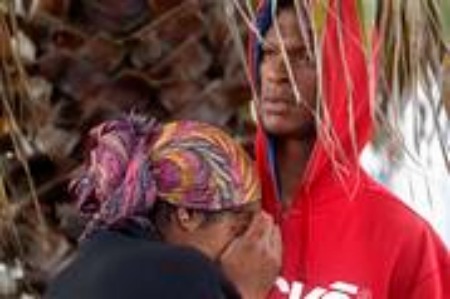 AP Photo/Schalk van Zuydam
AP Photo/Schalk van Zuydam
JOHANNESBURG (AP) — Education officials in a province in South Africa closed 16 schools, affecting 12,000 students, Thursday in an impoverished area near Cape Town because of a spike in gang violence that has left teachers too afraid to go to work.
Underscoring the level of violence, one man who was identified by fellow members as belonging to a gang called the Americans was shot dead Thursday in an area in Manenberg where many children play. The young man’s mother, Aysha Ismail, was distraught as she spoke to The Associated Press by phone soon after seeing her son’s body.
“My heart is broken because this gang violence must stop,” Ismail said through tears. “There are nearly a hundred small children playing around in the streets. We need a police patrol here.”
Western Cape Premier Helen Zille on Wednesday called for the army to be deployed to the area, an idea that a police spokesman opposed.
South Africa’s police services have increased their presence in the area recently, said spokeswoman for the Western Cape Education Ministry, Bronagh Casey. However the violence is still affecting schools in the area. A caretaker at one of the schools died after being shot weeks ago, and a stray bullet from gang violence hit a primary school around that time as well, Casey said.
“We are closing the schools because our educators say they are unsafe going to the area to report for duty,” Casey said, adding that students cannot be left unsupervised. “We rely on law enforcement in the area. Our education relies on a stable community in which to operate.”
The decision to close the schools came after meetings with the teachers.
Police spokesman Col. Tembinkosi Kinana said the situation in Manenberg is “undoubtedly bad” as long as people are being killed. He said police personnel have been deployed and there is a strategy in place to combat gang violence.
Zille, who is also leader of the Democratic Alliance party which controls the provincial government, said she had written to President Jacob Zuma, whose African National Congress party controls the federal government, last year asking for troop presence to curb persistent gang violence. She said the Western Cape government has not been approached by the national police to help deal with the problem.
“The presence of the army would give the police the space to conduct investigations and ensure gang members responsible for this violence are brought to justice,” Zille wrote in an open letter to Police Minister Nathi Mthethwa.
Zweli Mnisi, spokesman for South Africa’s police minister, said the police are opposed to the idea of deploying the army.
“What we require is an integrated approach that involves communities, parents of suspected drug addicts, government, NGOs and all other relevant stake holders,” Mnisi told the South African Press Association.